 In Distilled, you and your opponents are competing to earn the title of Master Distiller by obtaining ingredients, items, recipes, barrels, bottles, and distillery upgrades to craft and sell the best spirits to earn the most Spirit Points (SP).
In Distilled, you and your opponents are competing to earn the title of Master Distiller by obtaining ingredients, items, recipes, barrels, bottles, and distillery upgrades to craft and sell the best spirits to earn the most Spirit Points (SP).
Distilled is published by Paverson Games, and designed by Dave Beck. The game plays from 1-5 players and takes about 30 minutes per player.
Gameplay Overview:
Distilled is played in four phases over seven rounds (but no ice). Each player is dealt two distiller character cards and you select the character with the unique power that you prefer. Each character also has a signature recipe and ingredient. Players draw three secret distillery goals, but in a fun twist, you discard one of these goals after round three.
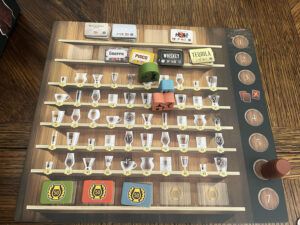
1. Market phase: There is a basic market and a premium market. You take turns purchasing items from the two markets. The basic market consists of yeast, water, basic grain, plant, and fruit sugar cards, as well as basic clay and wood barrel cards. Players may only purchase two cards from the basic market each round. The premium market has distillery upgrade cards (equipment and specialists), item cards (bottles, wood/metal/clay barrels), and premium ingredient cards, which cost more, but earn you more money and Spirit Points than basic ingredients.
2. Distill Phase: At the start of each game, a Recipe Tasting Flight is selected and lists which spirits can be distilled, with all flights allowing players to make moonshine and vodka. The tasting flight’s seven spirits require you to purchase their recipe prior to attempting to distill them. These spirits, along with each character’s signature spirit, have a certain number and type of sugar cards required to distill them.
Players each distill a spirit by using water, yeast, and sugar cards. You add one alcohol card per sugar card and shuffle the sugar, alcohol, water, and yeast cards together. Then you return the top and bottom card from this pile of cards to your pantry. The remaining sugar cards determine which spirit you have distilled. Once you have distilled the spirit, you add a barrel card and claim a spirit label.
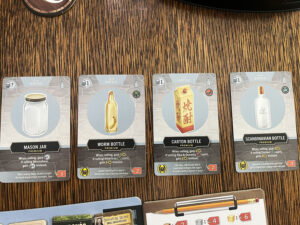
3. Sell Phase: If you distilled a spirit that does not require aging or you want to sell a spirit that you have previously aged, in this phase you add a bottle to the spirit and sell it. Collect the money and spirit points on the cards that make up the spirit. You select a spirit label bonus, add the bottle to your collection for a set collection end-game scoring based on the region of the bottle, and if it was an aged spirit gain the Aged spirit flavor bonus for each flavor card in the spirit.
4. Age Phase: Age your spirits in your warehouse by adding a flavor card.
At the end of each round, you check if you can claim one of the Spirit Awards (Awards change each game)
Game End: After seven rounds, you add spirit points earned from spirits still aging in your warehouse, from your bottle collection, distillery upgrades, distillery goals, and 1 spirit point for each 5 money.
Master Distiller is awarded to the player with the most spirit points.
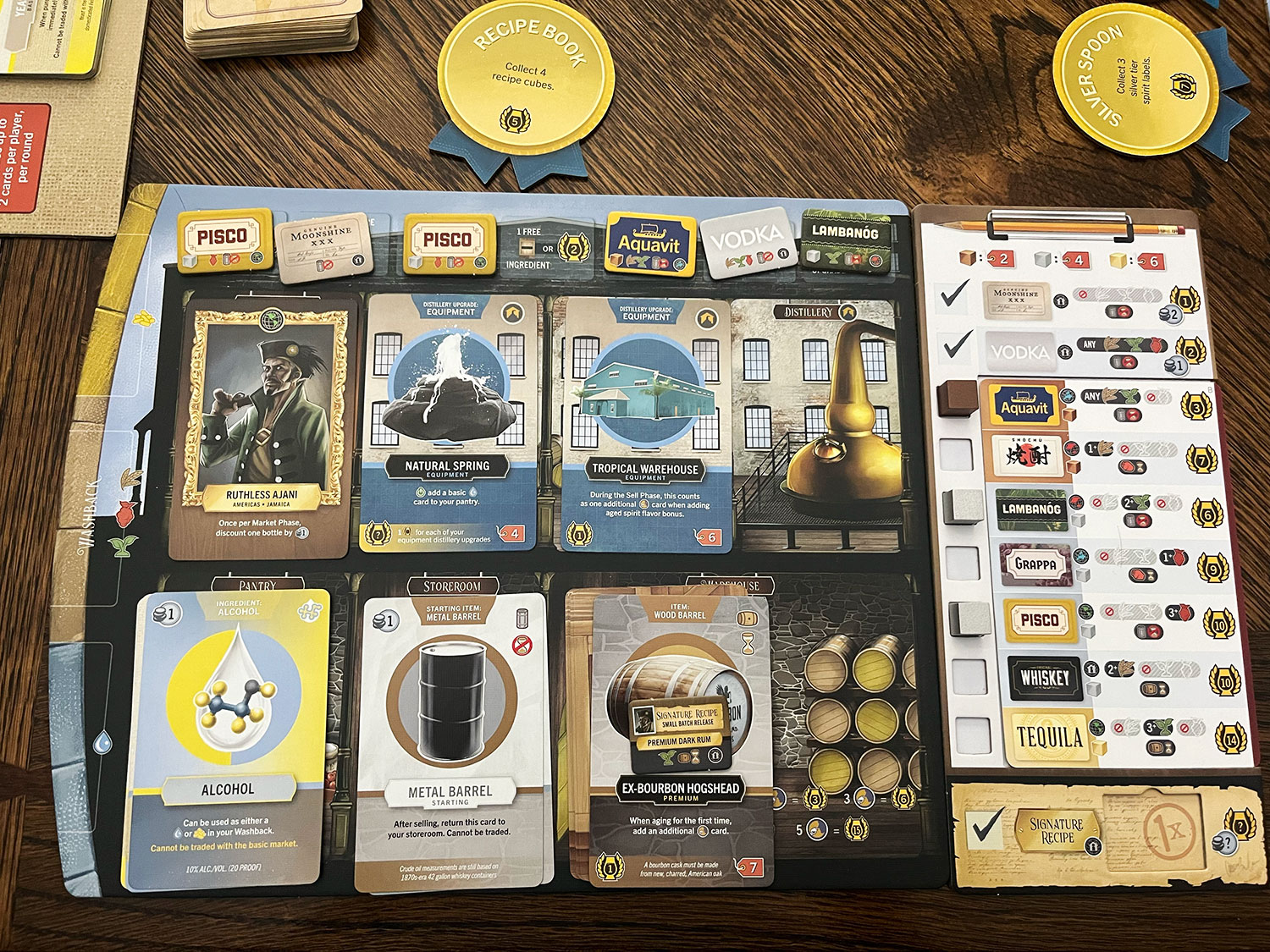
Game Experience:
Distilled is a beautiful game with really interesting art, well-made boards, high-quality cards and components, creative characters, interesting bottles, variable equipment and staff upgrades, and a perfectly designed storage system that makes clean-up a breeze.
Your first game is made smooth, like a good spirit, by following the “First Taste” Step-by-Step Guide, which forces you to make certain decisions to understand all of the mechanics of the game and how to score Spirit Points.
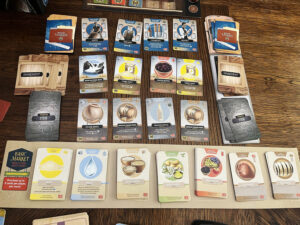
Every game has excellent variability created by the 18 distiller characters, the 8 Recipe tasting flight cards, the 20 distiller goal cards, the 23 Spirit awards, and the premium market cards. It also has excellent balance with all of our games being decided by three or fewer spirit points with one tie, although we house ruled something to make it have more balance. There are three regions Americas, Europe, and Asia/Oceania in the base game and we discovered that if two people are from the same region it can create competition for items, especially bottles and spirit labels, from your home region, while the third player was able to purchase all of the cards for their region unopposed. So in three-player games, we each selected a home region and then picked Distiller Identity/Character cards from that region.
Distilling your spirit can require some luck as you can only distill a spirit for which you have a recipe. Each recipe requires a specific sugar type and quantity. If the premium market does not contain the necessary sugar for your ideal spirit, you are limited to purchasing 2 of that sugar type from the basic market. There is a trade feature that allows you to trade one ingredient for a basic ingredient of equal or lesser value, but that only gets you a third sugar and there are recipes that require three sugars.
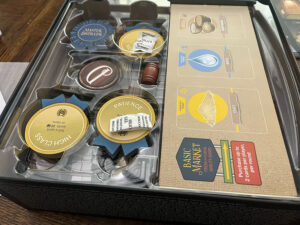
You might think, “Well then you can make your spirit”, but during the distilling process you discard two cards from your spirit and if you discard the sugar you needed, then you might end up making only moonshine or vodka. This is thematic in that distillers sometimes end up having to pivot if they do not achieve the taste they were going for, but can frustrate some gamers that don’t like chance in their games.
There are a fair number of rules to remember and between your distillery goals and spirit awards it can lead to some minor analysis paralysis. In my experience, this has lead to the game time being longer than I would like for a middle-weight game like this. But it is a very fun game that maintains the theme throughout and this game will make it to our table often.
Solo Mode: There is a solo mode. As I have mentioned in every review, I am not a solo board game player. This solo game had you lay out solo goals in a pattern shaped like a barrel which was visually cool, but that’s as far as I went into it.
Final Thoughts:
Great thematic market/card drafting game that while it is made for 1-5 players, appears to play best with three players, although with the Africa and Middle East expansion adding a fourth region, I would consider four players. Everything about Distilled was well made, there is a ton of variability that is only enhanced by the expansion, and the balance of the game kept all players engaged throughout each game. My only complaint is the game takes a little too long allowing the ice in my drink to melt and watering down my experience a bit.
Final Score: 4 Stars – I believe the spirit will move me to play this game often and I won’t be left with a hangover, I just might be a little tired from the time it took to completely Distill.
 Hits:
Hits:
• The art, components, rulebook, storage system, and step-by-step guide are all near the best I have experienced.
• Every game I have played has been close with one or two choices making the difference.
• Distilled sticks to the theme as well as almost any game.
• Despite the theme, teetotalers (weirdly not spelled teatotalers) and those under 21 can still enjoy the game and my 14-year-old has won the majority of the games we played.
Misses:
• After distilling the liquor in the game you do not actually have any alcohol to drink in real life.
• The game takes too long at a player count of three people, so I am scared to add a fourth or fifth player.





















